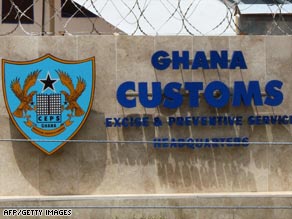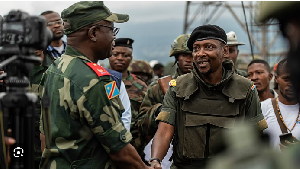Dr Kweku Twum-Baah, Acting Government Statistician, said on Thursday that information collected in Ghana showed that 31.3 per cent of children, or almost two million, were engaged in economic activity.
He said 39.7 per cent of children in rural areas and 17.6 per cent in the urban centres were engaged in economic activity. Dr Twum-Baah, who was speaking at Amasaman at the launch of the first Ghana Child Labour Survey Report, said about 57 per cent of the children were found to be working in areas like agriculture, forestry and fishing.
He said 21 per cent worked as hawkers and street vendors, selling iced water, food and other items. The report is a two-in-one survey, which canvassed children, from five to 17 years, in 10,000 selected households as well as children at 98 known locations of streets nationwide.
The fieldwork was conducted in February 2001 with technical assistance from the International Labour Organisation. Dr Twum-Baah said the 1998 Children's Act stated that children under 15 years were not to be employed but could do light work if they were 13 years and above.
The Act, he said, also stipulated that 18 years was the minimum age for the engagement of a person in hazardous work. Dr Twum-Baah said more than a million children aged less than 15 years were engaged in economic activities for pay, profit or family gain.
He said using the age limit set by the Act, and the hazardous nature of the work as criteria, an estimated total of more than one million children were in child labour in the country according to the boundaries defined by the Act. He said Mole Dagbon in the Northern Region had the highest proportion of children on the street followed by Akans.
Dr Twum-Baah said poverty was the underlying cause for child labour, it had been recommended that government's policy of creating wealth to reduce poverty should be given the needed local and international support especially in rural areas.
He said parents also needed to be educated on the relevant sections of the Act and on the damaging effects of child labour on the future development of children.
Mrs Angela Ofori-Atta, Deputy Minister, Ministry of Manpower Development, said the Ministry agreed with the report on the need to educate the parents and to restructure the Junior Secondary School System to make it attractive, relevant and accessible to children.
She said the System must be made to provide opportunities for final year students to re-sit their examinations in order to reduce the number of school dropouts swelling the number of children on the streets.
Mrs Ofori-Atta said though the Ministry had been involved in the implementation of the street children's component of the community-based poverty reduction programme with the World Bank, the result of the survey would provide it with the indicators to effectively monitor them.
She said the worst forms of child labour included slavery, debt bondage, prostitution, pornography, armed conflict and trafficking and must be eliminated. She said data on these activities were captured by the survey, the Ministry intended to undertake qualitative research in these areas with the desire to designing the appropriate interventions towards their elimination in Ghana.
She said the Ministry would utilise the data from this survey in rethinking its stance on child labour in Ghana.
A Senior Statistician of the International Programme on the Elimination of Child Labour (IPEC), George Okutho said 180 million children aged between five and 17 years were engaged in dangerous and hazardous labour activities in the world risking permanent damage to themselves.
He said eight million of those children were victims of modern slavery and sexual exploitation. Okutho said another 66 million children, who went to work were simply too young to be working, even though, they were not in the worst forms of child labour.
Mrs Gladys Asmah, Minister of Women and Children Affairs, said government had done its homework and was poised to deal ruthlessly with people, who indulged in child labour.
She said legislation to deal with it would be submitted to Parliament shortly. "We are bent on enacting laws to criminalize this illegitimate trade once and for all."
General News of Saturday, 21 June 2003
Source: gna
About 2m children engaged in economic activity
Entertainment











